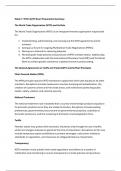Class notes
"Ultimate International Law Exam Prep: Comprehensive & Concise Notes"
- Course
- Institution
The "Law Final Notes" document provides a comprehensive overview of essential topics in international law, focusing on key principles and regulations. It covers the World Trade Organization (WTO) and its role in global trade, the foundational principles of the General Agreement on Tariffs and Trade...
[Show more]



